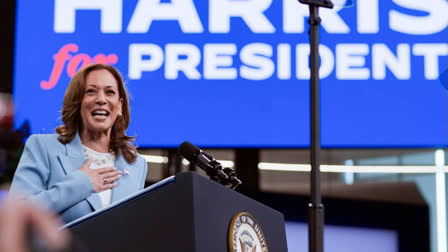Washington:Don't expect a balloon drop, at least not yet.
Delegates to the Democratic National Convention began officially selecting their nominee for president in a process that kicked off Thursday. But unlike in past years, they are not doing so in the raucous party atmosphere of the convention floor or even during the convention itself. Instead, they are filling out electronic ballots at their homes, offices or vacation spots more than two weeks before the first delegate steps foot inside Chicago's United Center.
Vice President Kamala Harris is the only candidate eligible to receive votes after no other candidate qualified by a Tuesday night deadline.
The "virtual roll call," the term used by Democratic National Committee officials, will allow Harris to claim the nomination by Monday evening. That's just 15 days after President Joe Biden announced he would not seek a second term following widespread concerns within the party over his ability to defeat Republican nominee Donald Trump in November.
How will the virtual process work?
Nearly 4,700 delegates are using an electronic voting method the party says is similar to one used to tally virtual roll call votes in the 2020 convention, when the COVID-19 pandemic forced the party to conduct much of its official business remotely.
Under new procedures adopted by the convention's rules committee in late July, candidates had until Tuesday to declare their intent to seek the nomination and until that night to submit the 300 delegate signatures required to qualify for the roll call vote. According to a DNC statement, Harris submitted signatures from 3,923 delegates, about 84% of the full delegation and 99% of delegates who signed a petition.
Any vote cast for someone other than Harris in the roll call will be counted as "present."
The voting concludes at 6 p.m. EDT Monday.
Who gets to vote?
Among those voting are pledged delegates selected through state primaries and caucuses as well as more than 700 others who have automatic delegate slots by virtue of the elected office or party positions they hold. These include Democratic governors, U.S. senators and representatives, former presidents and DNC members.
These automatic delegates, known informally as superdelegates, were the subject of much debate within the party for years because of their potential to influence the outcome of a close nomination fight despite not having been selected for their posts through a public process. Historically, however, superdelegates have never backed a candidate for the nomination other than the one who also earned the majority of pledged delegates.
After the 2016 election, the party passed changes that allowed superdelegates to vote only on the second and subsequent ballots. Party rules do allow superdelegates to vote on the first ballot if a candidate has either won a majority of pledged delegates through the primary and caucus process, like Biden did, or submitted the signatures of a majority of total delegates, as Harris did.
